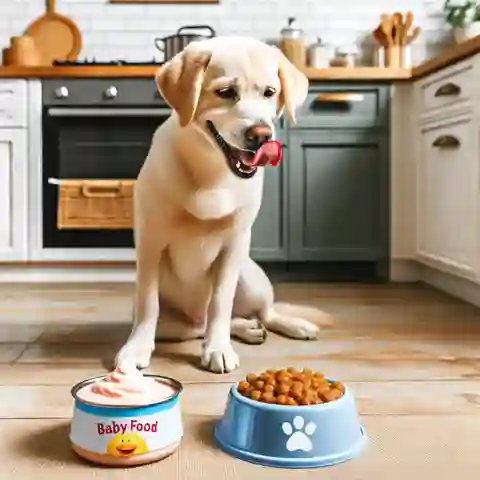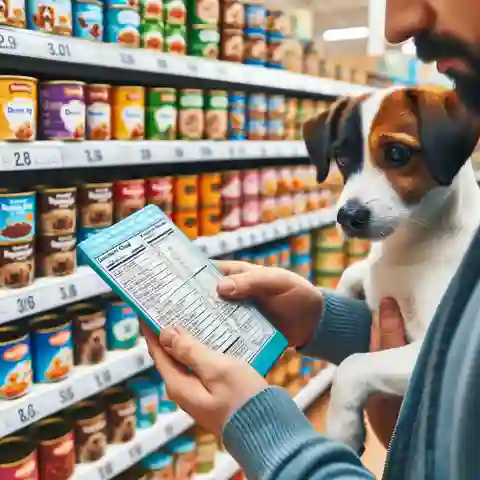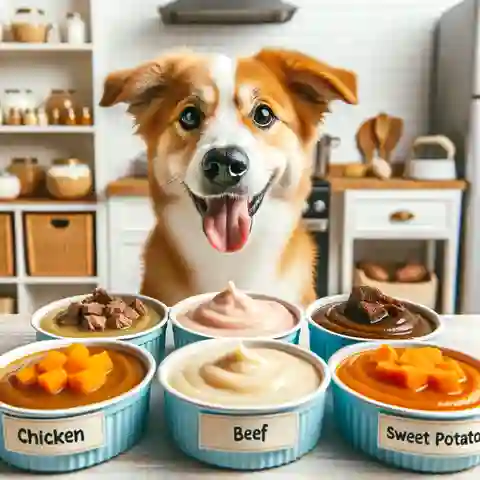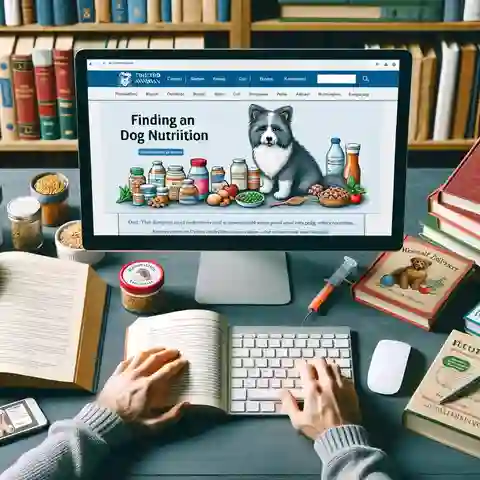Can puppies eat baby food? Have you ever considered whether baby food is okay for your dog? A lot of people wonder about this. Let’s look into whether baby food is a smart pick for your furry buddy.
What is Baby Food? Baby food is made for little kids. It’s soft and doesn’t upset the stomach. Because it’s so easy to swallow and gentle, some folks think it could be good for dogs, especially when they feel sick or have a tummy ache.
Baby food comes in many flavors. Some are fruits or veggies, and some are meats like chicken or beef. Since it’s made to be safe and gentle for babies, it’s super smooth. This can be handy if your dog is heavy. Help with their normal food. Maybe they need to eat more because they don’t feel good or are picky.
But it’s important to remember not all baby food is perfect for dogs. We must be careful because some baby food has stuff that dogs shouldn’t eat. Things like onions, garlic, chocolate, and some sweeteners are okay for humans but not dogs. So, if you’re considering giving your dog some baby food, you must check the ingredients first.
Even though baby food might seem like a good idea when your dog isn’t eating well, it’s not meant to be all they eat. It doesn’t have all the nutrients dogs need to be healthy and strong. It’s okay as a little treat or to mix with their regular food sometimes, especially if you’re trying to get them to eat something when they’re sick. But, their main food should always be dog food because it has the right stuff they need.
So, Can Puppies Eat Baby Food?
Yes, some of it can be, but you have to choose the right kind and only give it to them in small amounts. It’s always a good idea to talk to your vet first before giving your dog new food. They can help you make sure you’re picking the best food for your dog, especially if they’re not feeling well.

Why Would Someone Consider Feeding Their Dog Baby Food?
Here is why would someone consider feeding their dog baby food

Easy to Eat: Baby food is super soft and smooth. This means it’s really easy for dogs to eat, especially if they have a tummy ache or are feeling sick. Imagine if you had a sore throat and ate something soft like pudding. That’s why some people give baby food to their dogs.
Yummy Flavors: Sometimes, dogs don’t want to eat their regular food. Maybe they’re not feeling well or just picky. Dogs might find these flavors really yummy and want to eat even when they’re not feeling their best.
Helps with Medicine: Giving medicine to dogs can be tough. They might not like the taste. But if you mix the medicine with baby food, they might not even notice it’s there. The baby food hides the medicine taste, and dogs can take their medicine without any trouble.
Good for Sick Dogs: When dogs are sick or just had surgery, they might not want to eat their usual food. Baby food can be a good choice then. It’s easy to eat and can help them feel better while they’re getting back to their normal self.
Keeps Dogs Hydrated: Sick dogs might not drink enough water, which can make them really thirsty. Some baby food has a lot of water in it, which can help dogs stay hydrated. Think of it like eating a juicy fruit when you’re thirsty.
Easy to Find: Baby food is something you can find in almost any store, and it stays good for a long time.
Adds to Their Diet: While dogs shouldn’t eat baby food all the time, it can be a nice extra treat. It can make sure they’re getting enough to eat, especially if they’re not loving their regular food.
Giving baby food to dogs can be a good idea for a few reasons. It’s easy for them to eat, it tastes good, and it can even help when they need to take medicine. But remember, not all baby food is okay for dogs.
Is All Baby Food Safe for Dogs?

When you think about giving baby food to your dog, you might wonder if it’s safe. The simple answer is no, not all baby food is good for dogs. Here’s what you need to keep in mind:
- Some Things Are Bad for Dogs: Dogs can’t eat everything. Foods like onions and garlic are not good for dogs. They can make dogs very sick. So, if baby food has onions or garlic, don’t give it to your dog.
- Be Careful with Sweet Stuff: Some baby food might have sweeteners like xylitol. Xylitol is very bad for dogs. Even a little bit can hurt them. Always check the baby food label to be sure it’s safe.
- No Chocolate or Grapes: Chocolate and grapes (and raisins) are not good for dogs. If baby food has these, your dog should not eat it. These can make dogs very ill.
- Simple Foods Are Better: If you want to give your dog baby food, pick simple ones. Like just chicken or just beef. These are safer because they don’t have bad stuff for dogs.
- Ask Your Vet: If you’re not sure about a baby food, ask your vet. They can tell you if it’s okay for your dog.
Why Give Dogs Baby Food?

Easy to Eat: Baby food is very soft. This is good for dogs with a sore tummy or who are sick. It’s like eating pudding when your throat hurts.
Tasty: Some dogs don’t like their usual food, especially if they don’t feel good. Baby food has nice flavors like chicken or beef. Dogs might like these and want to eat.
Good for Medicine: It can be hard to give dogs medicine. Mixing it with baby food can hide the taste. This helps dogs take their medicine easily.
Helps Sick Dogs: If dogs are sick or had surgery, they might not eat their regular food. Baby food is soft and can help them feel better.
Keeps Dogs Hydrated: Sick dogs might not drink enough water. Baby food can help them stay hydrated. It’s like eating something juicy.
Easy to Find: You can find baby food in most stores. It lasts a long time, so you can keep it for when you need it.
Adds to Diet: Baby food can be a special treat. It shouldn’t be all they eat, but it can help make sure they’re eating enough.
Giving baby food to dogs can be helpful. It’s soft, tasty, and can even help with medicine. But, it’s important to choose the right baby food. Always check it’s safe for dogs and talk to your vet if you’re not sure.
What Ingredients in Baby Food Are Harmful to Dogs?

Not All Baby Food is Okay for Dogs: Some things in baby food are not safe for dogs. Here’s what to watch out for:
- Onion and Garlic: These can make dogs feel really sick.
- Chocolate: Some baby desserts have chocolate in them. But chocolate is very, very bad for dogs.
- Grapes and Raisins: Dogs shouldn’t eat these.
- Artificial Sweeteners: Stuff like xylitol, which you might find in some baby foods, is dangerous for dogs.
- Too Much Sugar or Salt: Dogs don’t need lots of sugar or salt. It’s not healthy for them.
Always Check the Label: Before you give your dog any baby food, read the ingredients to make sure it’s safe.
Can Baby Food Help Dogs with Sensitive Stomachs?
Yes, It Can Help: Baby food is soft and easy for dogs to digest. This is why it can be good for dogs with tummy issues:
- Gentle: It’s made to be very gentle, which is great for dogs with sensitive stomachs.
- Simple: Most baby food has just a few ingredients, making it simple and easy on the tummy.
But remember, baby food should only be a small treat for your dog. It doesn’t have all the nutrients dogs need.
How Should Baby Food Be Introduced to a Dog’s Diet?

Start Slowly: If you want to try giving your dog baby food, here’s how to do it safely:
- Pick Safe Baby Food: Choose baby food without bad ingredients. Flavors like chicken or turkey are usually good choices.
- Mix It With Regular Food: Begin by mixing a little bit of baby food with their usual food to see if they like it.
- Watch Your Dog: Keep an eye on your dog for any signs they might not feel good, like if they’re sleepy or have a tummy ache.
- Talk to Your Vet: If you’re thinking about giving your dog baby food more often, it’s smart to ask your vet first.
Always watch how your dog acts with the new food to make sure they’re okay.
What Are the Benefits of Feeding Dogs Baby Food?

Feeding your dog baby food might sound a bit unusual, but it can actually have some pretty cool benefits. Let’s talk about why some people choose to give their dogs baby food:
- Super Easy to Eat: Baby food is soft and smooth. It’s like giving them a tasty smoothie instead of a crunchy snack.
- Really Tasty: Sometimes, dogs get bored with their usual food, or they might not want to eat because they’re feeling sick.
- Helps with Medicine: Have you ever tried to give a dog medicine? It can be as tricky as getting a toddler to take their vitamins. Mixing the medicine with some delicious baby food can hide the yucky taste, making it a lot easier for your dog to swallow their meds without a fuss.
- Good for Sick Pups: When dogs are sick or just had surgery, they might not feel like eating their regular food. Baby food can be a gentle option to help them start eating again.
- Keeps Them Hydrated: Some dogs don’t drink enough water, especially when they’re sick. Since many types of baby food have high water content, eating it can help keep them hydrated. It’s a bit like eating a juicy fruit to quench your thirst.
- Convenient: Life gets busy, and sometimes, you might need a quick and easy food option for your dog.
- Adds Variety: Dogs, like people, enjoy trying new things. Adding some baby food to their diet can introduce them to new flavors and textures.
Giving baby food to dogs can be beneficial for many reasons.
How Much Baby Food Can a Dog Safely Eat?
Baby food can be a yummy treat or a little extra help for your dog, but it shouldn’t be all they eat. Here’s how to make sure it’s okay for them:
Treat, Not a Meal: Baby food is just for treats. It’s not the same as dog food. Dog food has special stuff in it that dogs need to be healthy. Baby food doesn’t have all that stuff.
Just a Little: It’s best if baby food is only a tiny part of your dog’s food. If your dog eats one cup of dog food in a day, you can give them baby food as a treat. But only about two tablespoons, not more.
Ask Your Vet: Every dog is different. They are big or small, young or old, and sometimes they have health stuff. Your vet knows your dog and can tell you how much baby food is okay for them to have.
It’s fun to give your dog something special, like baby food, but remember, it’s just for some time. Not too much!
Are There Specific Flavors of Baby Food That Dogs Prefer?

Dogs, just like us, have their tastes and preferences. Many dogs love meaty flavours the most. Here’s why:
- Meaty Goodness: Flavors like chicken, beef, and turkey are often big hits with the canine crowd. These tastes are close to what dogs would naturally choose to eat.
- Simple is Best: This means baby food that’s just chicken or beef is often a better choice than mixes with many ingredients.
- Veggies Too: Some dogs enjoy vegetable flavours, especially sweet potatoes or pumpkin. These are tasty and packed with good nutrients and fibre, which can help their digestion.
Can Baby Food Replace a Dog’s Regular Diet?

Baby food is like a snack or a special treat for dogs, not something they should eat all the time instead of their regular dog food. Here’s why:
- Not Complete: Baby food doesn’t have all the nutrients dogs need to stay healthy. Dog food is specially made to make sure your dog gets the right balance of things like protein, fat, and vitamins.
- Missing Ingredients: Dogs need certain things in their diet that baby food doesn’t usually have, like the right amount of calcium and phosphorus for strong bones.
- Balance is Key: Just like kids can’t live on ice cream alone (even though that might sound fun!), dogs can’t stay healthy eating only baby food. They need a balanced diet made just for them.
What Are the Signs of an Allergic Reaction to Baby Food in Dogs?

Sometimes, dogs can have allergies, just like people. Here are some signs to watch for if you think your dog might be allergic to something in baby food:
- Itchy Skin: Your dog might scratch a lot or rub against furniture or the floor to itch their skin.
- Upset Stomach: Look out for signs like throwing up, diarrhea, or not wanting to eat.
- Sneezing or Coughing: Just like people with allergies, dogs might sneeze or cough more if they’re allergic to something they ate.
- Swollen Face: You might notice swelling around their face, especially their eyes, mouth, or ears.
- Ear Problems: Dogs with allergies might shake their heads a lot or scratch their ears more than usual.
If you see any of these signs after giving your dog baby food, it’s important to stop feeding it to them and talk to your vet.
What Alternatives to Baby Food Are Safe and Healthy for Dogs?

Here are some alternatives:
- Cooked Lean Meats:Dogs love meat, and offering them cooked, lean meats like chicken, turkey, or beef (without any counted spices or sauces) is an excellent alternative. Make sure the meat is well-cooked and boneless.
- Plain Pumpkin:Canned, unsweetened pumpkin (not pumpkin pie filling) is great for dogs. It’s full of fibre and can help with their digestion. Just a spoonful mixed into their regular food can make a difference.
- Cooked Vegetables:Carrots, green beans, and peas. These should be cooked without any added salt or spices.
- Rice and Pasta:Cooked rice or pasta can be a good option, particularly for dogs with sensitive stomachs.
- Apples and Bananas: Apples (without seeds) and bananas can be a lovely treat. Just remember to give these in moderation because of their sugar content.
Where Can Pet Owners Find More Information About Safe Foods for Dogs?

It can seem a bit confusing, but don’t worry! There are lots of places where you can find good advice:
- Ask Your Vet:Your dog’s doctor knows all about what foods are right and wrong for your pet.
- Look at Reliable Websites:Some websites are all about keeping pets healthy and offer great tips on what dogs can and can’t eat. Just make sure these sites are trusted and the information is checked by vets.
- Read Books About Dog Food:There are books written by experts on dog nutrition.
- Check Out Animal Organizations:Groups like the ASPCA have websites with lists of foods that are safe or dangerous for dogs.
- Explore Pet Food Blogs:There are blogs online where people share recipes and tips for feeding dogs. Make sure these blogs are reliable and sometimes even checked by dog food experts.
In summary, can puppies eat baby food? When looking for the right food info for your dog, always ensure the source is good. And if you need more clarification on a new food, the best thing to do is to ask your vet.



